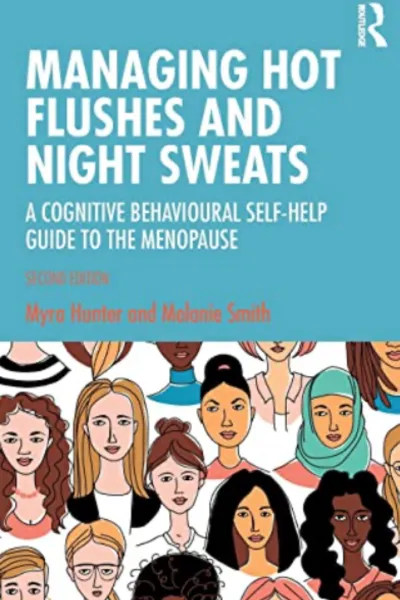The challenge is to develop public health approaches that normalise the menopause and challenge negative beliefs and attitudes, while at the same time, making available effective treatments and strategies for those women who need them. While much media attention is about HRT, some women prefer non-medical options and for others HRT may be contraindicated.
Professor Myra Hunter, Emeritus Professor of Clinical Health Psychology at King's IoPPN
18 April 2023
Historically menopause has been overlooked and trivialised. Though a natural process, for some women physical and psychological symptoms of menopause can be debilitating, seriously impacting a woman’s life. Over the last decade, King’s has been a pioneer in menopause research, bringing innovative treatment options to women, influencing policy and medical guidelines, and helping to normalise the conversation.
Menopause is the time of life when a woman's ovaries stop producing hormones and menstrual periods stop. The cessation of menstrual periods is often associated with a variety of symptoms, including vasomotor symptoms (hot flushes and night sweats), anxiety, depression, decreased libido, vaginal dryness, insomnia and difficulty concentrating (brain fog). In the UK alone, there are over 7.2 million women aged between 45-60, the ages when menopause most commonly occurs, so around 1.8 million women could be experiencing problematic symptoms at any one time.
The most common symptoms are hot flushes and night sweats, which affect about 80 per cent of middle-aged women. Around a quarter of women report that these symptoms affect the quality of their daily lives, and women report that they can be particularly difficult to manage at work. King’s researchers have focused on modifying workplace factors, such as increasing awareness of menopausal symptoms and training managers, as well as strategies for women to use to reduce the impact of symptoms.
Hormone Replacement Therapy (HRT) is an effective treatment for moderate to severe symptoms, but is not recommended for women who have had, or are at increased risk of, breast cancer as HRT will elevate their oestrogen levels. In addition, many women are uncertain about the health risks and benefits of HRT or prefer a non-medical option to manage symptoms.
A 2011 King’s study of over 10,000 women found that 54 per cent reported having hot flushes and night sweats up to 10 years after their periods stopped, demonstrating the need for safe, acceptable and effective non-hormonal treatment alternatives for moderate to severe menopausal symptoms.
King’s researchers, led by Professor Myra Hunter, Emeritus Professor of Clinical Health Psychology at King’s College London, demonstrated that the menopause transition is a process that is influenced by a range of bio-psycho-socio-cultural factors. Psychological factors - including stress, negative beliefs about menopause, social embarrassment, feeling out of control and frustration and concern about the reactions of other people - are associated with more problematic menopause symptoms. Behavioural reactions (such as trying to hide symptoms and avoiding social situations) are also linked with flushes and sweats.
Based on these findings, King’s researchers designed a model that recommends psychoeducation (providing information and support to better understand and cope with menopausal symptoms) and cognitive behavioural strategies to manage hot flushes and night sweats.
Providing alternative treatments options: Cognitive Behavioural Therapy (CBT)
Based on the insight provided by King’s research into the multiple factors that influence menopause symptoms, Professor Myra Hunter was the first to develop and evaluate a menopause-specific cognitive behavioural therapy (CBT) intervention in a series of clinical trials. The CBT intervention involved helping women to identify thinking patterns and behavioural responses that can reduce the impact of symptoms and provides a safe and effective non-hormonal treatment for women with problematic menopausal symptoms.
King’s CBT approach was evaluated in four randomised controlled trials called ‘MENOS’. These showed that both group and self-help CBT reduces the impact of problematic hot flushes and night sweats by an average of 50 per cent, both for breast cancer patients and for women in the general population. The CBT also significantly improved aspects of quality of life and measures of mood and memory problems.
The multicentre MENOS UK RCT (MENOS@Work) was carried out in eight public and private organisations, the first time such an intervention had been tested in the workplace. King’s CBT self-help model had significant and positive impact on hot flushes, night sweats, wellbeing, sleep, work and social adjustment and presenteeism – women being at work without impairment from symptoms.
King’s researchers then collaborated internationally to adapt and test the MENOS protocol in clinical trials in the Netherlands, which showed the efficacy of internet-based CBT for treatment of menopause symptoms. With colleagues in the Netherlands, Professor Hunter developed a computerised CBT (cCBT) form of the intervention for breast cancer patients, enabling even more people to access the support.
King’s research has underpinned partnerships with cancer charities. Breast Cancer Care (the main UK charity for patients), has run 12 CBT group workshops since 2014 in NHS facilities across the UK, attended by 150 women (figures in 2019). Maggie's is a charity providing free cancer support and information in centres across the UK and online and has partnered with King’s to make CBT for menopause available to women accessing their services. King’s staff are currently training clinical staff to deliver online CBT in six centres, with a further 18 centres planned.
King’s has also informed further work with marginalised communities, working with Handsinc charity in Hackney to develop the ‘Reclaim the menopause’ group sessions for women of ethnic minorities in the community who might not otherwise easily access services.

King’s research has not only demonstrated the effectiveness of CBT for menopause but worked further to adapt the intervention to suit different patient populations (breast cancer patients), settings (workplace), service delivery (computerised CBT) and communities. By establishing ways to reach as many people as possible and in different formats – King’s research has made CBT for menopause widely accessible. The Self-help CBT has been published in a book based on the research and evaluated in the MENOS trials, published by Routledge (2nd Edition 2021).
Transforming policy and guidelines
King’s research into the use of CBT for the treatment of menopausal symptoms has shaped national and international policy and guidelines. King’s CBT research was the only work of this kind cited to support the inclusion of CBT as an effective treatment for anxiety and depressed mood during menopause, in the first menopause National Institute for Health and Care Excellence (NICE) Guideline in 2015: ‘Menopause: Diagnosis and Management’.
NICE is currently carrying out a consultation to update the 2015 NICE guidance specifically to consider the impact of CBT for hot flushes and night sweats, based on recent trials carried out by King’s researchers, to be published in 2024.
NICE has also endorsed a resource for GPs and health professionals to provide menopausal women with information and advice about CBT. Based on her body of research, Professor Myra Hunter was appointed Expert Advisor on the NICE Guideline. CBT is now recommended by NICE in the UK for women experiencing mood changes during menopause symptoms, and the 2022 position statement from the North American Menopause Society considers it one of the most effective non-medical treatments for hot flushes and night sweats (vasomotor symptoms) available. Moreover, based on King’s research the Chief Medical Officer’s 2015 report recommended CBT for symptoms in working women: ‘Non-pharmaceutical treatments such as cognitive behavioural therapy are helpful in reducing the impact of menopausal symptoms'.
Training in healthcare and workplace environments
King’s research on CBT for menopausal symptoms has been recommended, and is being implemented, by healthcare professionals in the UK. In a partnership with the British Menopause Society (BMS), King’s academics produced a factsheet for women (Cognitive Behaviour Therapy (CBT) for Menopausal Symptoms).Furthermore, an annual two-day course, set-up in collaboration with the British Menopause Society, has run four times since 2018 and has trained 86 health professionals to run CBT groups for women. There has also been further training of breast care teams in hospitals, such as the MENOS4 trial which was commissioned to both evaluate the approach and train UK breast cancer nurses in delivering the CBT intervention. A treatment manual published by Routledge in 2015 has been bought by over 300 health professionals to date as part of their training.
King’s research has helped women in the workplace manage their menopausal symptoms. The Chartered Institute of Personnel and Development (CIPD) now recommends CBT treatment in their 2019 report based on NICE recommendations and King’s research in the workplace. The BMS also have a factsheet for employers based on King’s research. The charity Henpicked is one of the UK’s largest, fastest growing communities for women over 40, and has created online resources based on King’s research. It also runs seminars in the workplace on menopause, and King’s CBT and research is an important element in their training. Over the past four years hundreds of employers have attended their training sessions. Feedback from the Department of Education after a seminar included “never seen such positive feedback after any session”. TUC Wales has produced a toolkit for trade unionists ‘The menopause in the workplace’ which also draws on many of the resources King’s research has informed.
Normalising Menopause: Challenging the biomedical narrative
King’s researchers, as part of an international group of experts, have recently called for discussions around menopause to be normalised, arguing that medicalising menopause may be unhelpful for some women. They suggest that treating menopause as simply a hormone deficiency could fuel expectations that most women should use HRT, which is not the case.
The authors also called for a more balanced narrative that challenges an ageism that tends to affect women more than men. According to the BMJ analysis, social and cultural factors play a major role in women’s expectations and experiences of menopause, King’s researchers explain that the belief that ageing can be delayed or reversed by HRT persists and is reinforced by the media, medical literature and information for women, often driven by marketing.
There has been a growing awareness of the impact of menopause on women's health and quality of life in recent years, and King's has been at the forefront of this effort. Through research, advocacy and patient care, King's has helped to bring new treatment options to women and has played an important role in shaping medical policy and guidelines. By normalising the conversation around menopause and raising awareness about its potential impact, King's has helped to ensure that women have the support and resources they need to manage this important transition in their lives.
It has been so gratifying to have this body of work on menopause - carried out over several decades - included as an Impact Case study in the 2021 REF submission. Thank you to wonderful colleagues past and present, and a big thanks to Sally Marlow for her help in putting it all together!
Professor Myra Hunter, Emeritus Professor of Clinical Health Psychology at King's IoPPN




